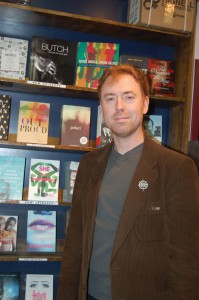The oldest LGBTQ bookshop in the world is still proud to be in business

The Glad Day bookshop’s new release section with manager Scott Dagostino. Photo: Maverick/The Dialog
Even on a rainy afternoon, the rainbow flag proclaiming the location of Glad Day bookshop can be seen from the corner of Yonge and Wellesley. Its bright colours adding a sharp contrast to the dark skies overhead.
The bookstore’s use of colour is not limited to the flag; the inviting entrance is painted in shades of lavender and pink while enticing bulletin boards filled with postings for community happenings line both sides of the two flight climb to the bookshop, indicating that Glad Day is something other than a typical bookshop.
According to manager Scott Dagostino, three reasons for the bookstore’s continued existence is the loyalty of its customers, its status as a Toronto legend, and the continued influx of new customers impressed by their selection of books.
This is a good thing because Toronto is a graveyard for typical bookshops such as: This Ain’t the Rosedale Library, Book City, the Worlds’ Biggest Bookstore, and the many Chapters locations, some of which have closed within the past five years; bucking this trend, the Glad Day bookshop has been open for the past 44 years.
In an era when bookstores across Toronto are shutting their doors and selling off their stock, this bookstore has remained in business making it the oldest queer and trans* bookstore in the world.
“Our new release wall could go toe-to-toe with that of any bookstore in the country,” said Dagostino confidently before listing off some of the authors and categories on their wall.
Michael Went, owner of Glad Day, explains the motivation behind this varied selection saying, “as a community, we’re changing in terms of age, gender, sexual identity, race, religion and accessibility. Some places in the village have changed along with that to become more inclusive, and some have not. Glad Day is choosing to embrace diversity into its new DNA.”
A third Glad Day shareholder, Michael Erickson describes this diversity by saying, “our transgender content has the highest rate of sales because you can’t find those books anywhere else.”
In terms of the store’s evolution prior to the 22 people who pooled their funds to buy it, Glad Day merely had a physical location.
It now has an online presence, including Facebook, twitter and tumblr, and also has a website with an online store that was created as a result of a $15,000 online crowd-funding campaign.
Since Glad Day’s physical location is up two flights of stairs, rendering it out-of-reach to patrons who have accessibility issues, the existence of the online store allows people to browse some of Glad Day’s selection online, as well as placing online orders to be shipped to their address.
The creation of the online store has been a success, said Dagostino proudly.
Though only 2,000 titles from Glad Day are posted online, Dagostino says that the volunteers, colloquially called fairies, add items to the online store, work backwards by posting new releases first before adding older titles.
In terms of store staff, Dagostino joked that he lives at Glad Day in his role as full-time manager, mentioning the other three part-time employees, and a rotating cadre of fairies, who pitch in to help as needed.
Dagostino echoes the motivation behind the volunteers’, shareholders’ and customers’ commitment to the store by saying, “Toronto would be the poorer for not having Glad Day.”

